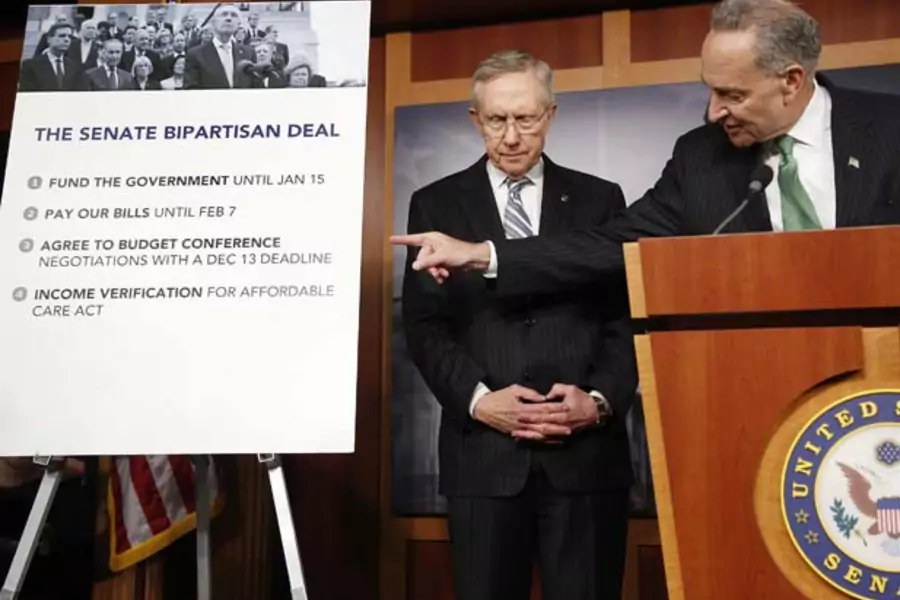The World Next Week: Congress Averts a Debt Crisis, Indian Prime Minister Singh Visits Beijing, and Pakistani Prime Minister Sharif Visits Washington

The World Next Week podcast is up. Bob McMahon and I discussed the next steps for Congress after avoiding the debt ceiling, Indian prime minister Manmohan Singh’s visit to China, and the upcoming meeting of President Obama and Pakistani prime minister Nawaz Sharif in Washington.
[audio: http://www.cfr.org/content/publications/media/editorial/2013/20131017_T…]
The highlights:
- Congress at the very last moment passed legislation ending the partial government shutdown and averting a government default. That’s the good news. The bad news is that Congress didn’t resolve the underlying fiscal problems that precipitated the crisis; it merely kicked the can down the road. The U.S. government is funded only through January 15, 2014 and the debt ceiling suspension lasts only until February 7, 2014. The House and Senate have pledged to hold talks with a December 13, 2013 due date on finding a long-term solution. But the two sides remain far apart on core tax and spending issues. So be prepared for a repeat of the drama of the last few weeks at the start of the new year. None of this is good news for U.S. foreign policy. Budget issues will continue to crowd out foreign policy issues in Washington, U.S. friends and allies will continue to doubt Washington’s ability to act decisively and strategically, and the U.S. economy, which is the wellspring of U.S. influence abroad, will continue to be sapped by uncertainly.
- Indian Prime Minister Manmohan Singh travels to China next week to meet with Chinese leader Xi Jinping. The two men have much to discuss. Topping the list is the two countries’ longstanding border disputes, which sparked a war back in 1962 and which flare up from time to time. Singh and Xi will also be talking about trade. More extensive trade relations could help each country; China and (especially) India have both seen economic growth slow in recent years. Nonetheless, distrust continues to permeate the relationship as each power sees the other as a potential rival and threat. The net result is that while the Singh-Xi talks may produce upbeat public remarks and some minor agreements, a major diplomatic or economic breakthrough seems unlikely.
- Pakistan will be paying close attention to what its two neighbors, China and India, say in Beijing. Pakistani Prime Minister Nawaz Sharif will be watching from Washington, where he will meet with President Obama on October 23. It will be the first meeting between the two men. U.S.-Pakistani relations have been strained for several years, and the United States worked closely with General Pervez Musharraf, the man who overthrew Sharif the first time he was prime minister. Sharif will likely press Obama to further curtail U.S. drone attacks in Pakistan, which are deeply unpopular with average Pakistanis, as my colleague Dan Markey discusses at length in his new book, No Exit from Pakistan: America’s Tortured Relationship with Islamabad. The future of Afghanistan will also figure prominently when Obama and Sharif sit down to talk. The continued U.S. drawdown in Afghanistan, which could potentially turn into a withdrawal, presents Islamabad with opportunities and dangers.
- Bob’s Figure of the Week is 1,000. My Figure of the Week is Mohammad Javad Zarif. Our audience-nominated Figure of the Week comes from TWNW listeners @frombrooklynto and @TheNerdExtemper who both picked 19. As always, you’ll have to listen to the podcast to find out why.
For more on the topics we discussed in the podcast check out:
Debt Ceiling Vote: The New York Times reports that Republicans have backed down in budget negotiations. Politico argues that President Obama got everything he wanted. Robert Kahn believes the deal doesn’t address the underlying causes of the conflict. The Economist says Congressional “last-minutemen” avoided long-term problems in reaching a deal.
India-China Meeting: The Business Standard summarizes the issues to be discussed at the meeting. The Times of India writes that China wants to focus discussion on business and avoid security issues and water disputes. The Indian Express argues that India should lift restrictions on foreign investment in rupee denominated debt. Reuters describes continuing border disputes between India and China. The BBC profiles Prime Minister Manmohan Singh.
Obama-Sharif Meeting: Dawn describes Prime Minister Sharif’s policy on the U.S.-Pakistani relationship. The Nuclear Threat Initiative’s Global Security Newswire says the meetings are an opportunity to discuss global nuclear security. Dan Markey explains how the United States can assist in regional dialogue between Pakistan and India and why there is “no exit from Pakistan.”
 Online Store
Online Store